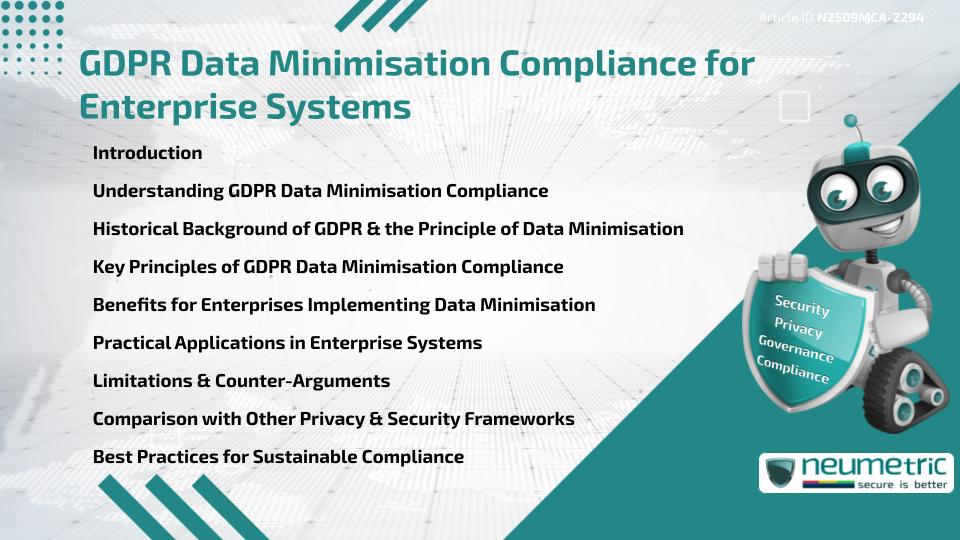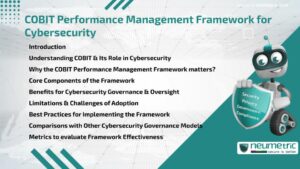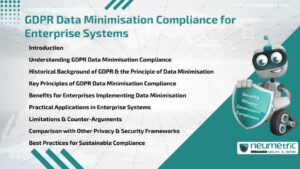Table of Contents
ToggleIntroduction
GDPR data minimisation compliance requires enterprises to collect, process & store only the Personal Data necessary for specific purposes. The General Data Protection Regulation [GDPR] highlights data minimisation as a fundamental principle for protecting individual rights & reducing Risks. For enterprise systems, compliance means adopting Policies, technical controls & Governance practices that limit unnecessary data. By following GDPR data minimisation compliance, organisations enhance efficiency, reduce legal Risks & strengthen Customer Trust.
Understanding GDPR Data Minimisation Compliance
The principle of data minimisation under GDPR ensures that Personal Data collected is adequate, relevant & limited to what is required. Enterprise systems often handle vast amounts of Personal Information, making minimisation essential to avoid over-collection & misuse. GDPR data minimisation compliance therefore compels organisations to design systems that process only the information required for business purposes while discarding or anonymising excess data.
Historical Background of GDPR & the Principle of Data Minimisation
GDPR came into effect in May 2018, replacing the Data Protection Directive of 1995. While earlier laws addressed Privacy, GDPR strengthened principles such as transparency, accountability & minimisation. The rise of digital services, cloud platforms & big data created new challenges, making stricter data minimisation requirements necessary. This evolution ensures that enterprises handle Personal Information responsibly in an increasingly data-driven economy.
Key Principles of GDPR Data Minimisation Compliance
GDPR sets clear standards for data minimisation, including:
- Collecting only data necessary for specific purposes.
- Avoiding excessive or irrelevant data collection.
- Regularly reviewing stored data for relevance & accuracy.
- Ensuring retention aligns with defined business or legal requirements.
- Deleting or anonymising data once no longer needed.
These principles prevent enterprises from holding unnecessary data that could increase Risks of breaches & penalties.
Benefits for Enterprises Implementing Data Minimisation
Enterprises adopting GDPR data minimisation compliance enjoy multiple benefits:
- Reduced legal exposure to GDPR penalties.
- Lower storage & system management costs.
- Increased operational efficiency by handling less redundant data.
- Strengthened Customer Trust through responsible data practices.
- Enhanced ability to comply with other global Privacy regulations.
For enterprises with international operations, data minimisation also supports cross-border compliance & smoother partnerships.
Practical Applications in Enterprise Systems
Applying data minimisation involves embedding controls into enterprise systems & workflows. Examples include:
- Designing forms that collect only essential fields.
- Implementing role-based Access Controls to limit unnecessary visibility.
- Automating deletion of outdated or redundant records.
- Anonymising or pseudonymising data when detailed identifiers are not required.
- Conducting periodic audits to ensure compliance.
For instance, an e-commerce platform may limit data collection to shipping addresses rather than requesting unrelated personal details.
Limitations & Counter-Arguments
While beneficial, GDPR data minimisation compliance presents challenges. Some argue that strict minimisation may restrict innovation, especially in areas like Artificial Intelligence where large datasets are valuable. Others note that determining what data is “necessary” can be subjective & vary across industries. Additionally, compliance can be resource-intensive for small organisations with limited capacity for system redesign or monitoring. These factors highlight the need for balanced, context-based application of data minimisation.
Comparison with Other Privacy & Security Frameworks
GDPR data minimisation compliance is similar to principles in frameworks like the California Consumer Privacy Act [CCPA] and South Africa’s POPIA. However, GDPR sets stricter requirements with broader territorial scope. Compared with ISO 27001, which focuses on Information Security management systems, GDPR emphasises Privacy & data subject rights. Data minimisation also aligns with OECD Privacy Guidelines, which promote limiting data collection to what is relevant & necessary.
Best Practices for Sustainable Compliance
To ensure sustainable GDPR data minimisation compliance, enterprises should:
- Conduct data mapping to understand information flows.
- Define clear purposes for data collection & processing.
- Train Employees on minimisation principles & responsibilities.
- Use technology to automate data retention & deletion processes.
- Review compliance regularly & update practices as business needs evolve.
These practices embed minimisation into the organisational culture rather than treating it as a one-time effort.
Takeaways
GDPR data minimisation compliance ensures that enterprises collect & process only necessary Personal Information. While implementation may require investment, the benefits in compliance, efficiency & trust far outweigh the challenges.
FAQ
What is GDPR data minimisation compliance?
It is the practice of ensuring Personal Data collection & processing are limited to what is necessary for specific purposes.
Why is data minimisation important?
It reduces legal Risks, protects individuals’ rights & strengthens Customer Trust by avoiding unnecessary data collection.
Does data minimisation limit business innovation?
In some cases, yes. Strict minimisation can limit access to large datasets, but it encourages businesses to innovate responsibly.
How can enterprises implement data minimisation?
By collecting only essential information, automating data deletion & restricting access through role-based controls.
Is data minimisation a one-time activity?
No, it requires ongoing reviews, audits & updates as business practices & systems evolve.
How does GDPR differ from CCPA in terms of minimisation?
GDPR sets stricter & more explicit minimisation requirements, while CCPA emphasises consumer rights & transparency.
What happens if enterprises fail to comply?
Non-compliance can lead to significant Financial penalties, reputational damage & loss of Customer Trust.
Need help for Security, Privacy, Governance & VAPT?
Neumetric provides organisations the necessary help to achieve their Cybersecurity, Compliance, Governance, Privacy, Certifications & Pentesting needs.
Organisations & Businesses, specifically those which provide SaaS & AI Solutions in the Fintech, BFSI & other regulated sectors, usually need a Cybersecurity Partner for meeting & maintaining the ongoing Security & Privacy needs & requirements of their Enterprise Clients & Privacy conscious Customers.
SOC 2, ISO 27001, ISO 42001, NIST, HIPAA, HECVAT, EU GDPR are some of the Frameworks that are served by Fusion – a SaaS, multimodular, multitenant, centralised, automated, Cybersecurity & Compliance Management system.
Neumetric also provides Expert Services for technical security which covers VAPT for Web Applications, APIs, iOS & Android Mobile Apps, Security Testing for AWS & other Cloud Environments & Cloud Infrastructure & other similar scopes.
Reach out to us by Email or filling out the Contact Form…





